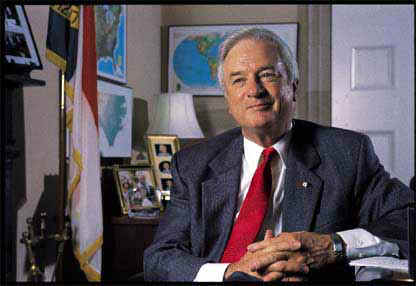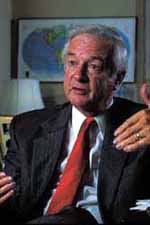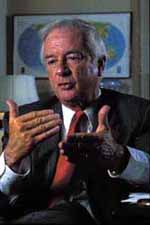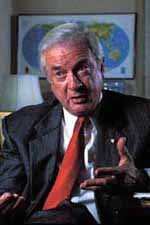
Citizen Jim
Gov. Hunt says he will be `very
active'
in public affairs after his fourth term ends,
especially in economic development
Editor's Note: James
Baxter Hunt Jr., who will complete his fourth, and
apparently final, term as governor next month, seemed
relaxed and rested when we stopped by his office for this
interview. As we were entering his Capitol office, four
top executives of a German company were leaving, and it
was apparent from their conversation that they had just
received one of Gov. Hunt's famous pep talks on the
benefits of expanding their business in North Carolina.
Because he was so focused on that issue, it seemed
appropriate to begin the interview on that topic. What
follows is an edited transcript of that interview with
Editor Steve Tuttle:
What
have been your principles in economic development?
I want
people to have good jobs. I want them to be able to
provide well for their families, take care of their
children. In a sense, all that I've been about as
governor grows out of that. I grew up with a lot of poor
people around me, and I really felt for them, and I still
do. So in a sense you could look at my whole career and
say, well, Jim Hunt is committed to getting good jobs for
the people of North Carolina and has figured out what it
takes to build the quality of life that will attract
investment and good jobs.
The
folks in economic development circles are wringing their
hands about losing you as the state's best and most
visible salesman. They're hoping you might continue in
that role in some way.
Let me
first say that I will be fully supportive of whoever is
my successor here. He will be the governor of North
Carolina and I will be a private citizen, but I will be a
very active private citizen, willing to do anything I can
to support economic development, and to continue to
appropriately encourage companies that I've worked with
over the years. You know, I recruited the first Japanese
industries here. I've led more foreign missions, maybe
more than all other governors put together. But the fact
is I have put my heart and soul into this and I know the
people involved; I know what their concerns are because
we've worked with them. So in the private sector,
whatever I'm doing, I will be there as an interested
citizen, anxious to help in any way I can, and very
careful not to get in the way of the new governor.
In your
opinion, what type of governor do you think you've been?
What adjectives would you use to describe yourself?
I believe
I am a governor who cares very deeply about people. I
hope people will say that I understood economic
development and how people need good jobs; that I
realized the importance of a smart start, good public
education and higher education; that I worked
wholeheartedly with the private sector to identify their
needs and how we can work together as partners; and that
I worked at this job with as much energy, drive and
aggressiveness as I possibly could.
It's
been remarked that you were among the first of the
“New Democrats,” a consensus builder who could
work equally as well with the business community as you
could other opposing groups. Is this something that you
strove consciously to create or did you just see the
tools there and use them?
I did not
consciously strive to create anything. I've always tried
to do what works. I don't come from some ideological
position. I want to treat people right and give them
equal opportunities. I understand how the world works and
I understand how the private sector works. The answer is
not in narrow partisanship. I'm a Democrat, I believe in
the precepts of Thomas Jefferson, Franklin D. Roosevelt,
Harry Truman, John F. Kennedy. My goal has always been to
help develop a state in which people have the good jobs,
get the good start, have an excellent public education
and live within an environment that is clean and makes
for a good quality of life. I don't think about the
party. I think about the common good and I see the party
as serving that. So, yes, I'm delighted to be called a
New Democrat or a modern Democrat or whatever the name is
— if you let me define that, and to me that means
identifying the things that help people, that enable
people to be successful; being pro-business, supporting
business and understanding
what their needs are and supporting public policies that
promote all these things. Frankly, I have found that
there is a great community somewhere in the middle here
between people who push hard for major public investments
and those who insist on accountability in things like
education and who are responsible for the success of
business. That's why people like Phil Kirk and I have so
much in common. That's why I have so much in common with
the heads of major corporations in North Carolina. I'm
going up to cut the ribbon on the new Nucor steel plant,
a plant that really tested fully my ability to bring
environmental concerns and economic needs together, as
much as anything I've ever done. But that's the way I see
the world. I don't see the world as political. I don't
seen the world as partisan. I know you have to be
political to work successfully in that environment. But
my goal is to get things done.
You
were the first governor to have the veto, but you never
used it.
I haven't
used it by vetoing a bill (laughs). The benefit of the veto is for the
legislature to know and the people to know that the
governor does have a voice. And you should use it not on
the back end as much as on the front end so you're really
a part of the conversations, you really get a chance to
point out what's at stake. I think the governor's office
has been greatly strengthened by the veto. It has been a
real help and I have used it actively, regularly, in
influencing what came out of the legislature.
How
does it feel to hear you name mentioned in State of the
Union speeches and in the presidential debates?
It makes
me feel good for North Carolina. It's nice. It makes me
very proud that people are aware of what we've been
doing. It's a compliment to the state of North Carolina,
not to me personally.
Looking
back over your 20 years in public office, if you had one
thing to do over, what would it be?
I would
start earlier on some of the initiatives that have become
full blown now. I helped put in kindergarten in this
state; I wish we had put in Smart Start at the same time.
I put in a minimum competency test in my first two terms;
I wish we had put in a maximum competency test, as we now
have. I started efforts to improve teacher training, to
see that they were better prepared. I wish we had had a
national board for professional teaching standards back
then. But you need to learn about these things as you go
along. You start off feeling you're pretty knowledgeable,
but I've learned so many things over the years.
What
areas do you think you have been most successful at?
Economic
development and education.
What
areas do you think you have been least successful at?
I don't
think there are any areas where we've been unsuccessful.
But trying to get the bureaucracy to renew itself and to
focus on goals and customer service and quality work has
been real tough. We have batted our heads in and we have
tried and we have made improvements. But we haven't done
as much as I would like.
What
will be the first thing you do after you move out of the
Governor's Mansion in January and your successor is sworn
in?
(Laughs) You have to understand I have had
some experience at that. I think the first thing I will
do is we will go down to my farm in Wilson County, and I
will check with my grandson to see if there is any chance
we can go deer hunting. And then I will feed my cows.
I'll visit my elderly father, who's pretty infirm. I'll
love my wife and spend more time with her. And then I'll
get about the next things I'll be doing in my life.
There's some business possibilities. I may return to my
law firm. I will continue to chair the National
Commission on Teaching and America's Future, working on
the Carnegie Corporation board. Jim Hunt's going to be
real busy. And I will continue to be available to anybody
in government, the legislature, if I can provide some
advice, if I can help encourage some companies to invest
here and bring jobs here — again, being very, very
careful not to get in the way of the new governor and the
new administration.
Are
there any role models you've considered emulating as you
take on this new role as, for lack of a better term, an
elder statesman of North Carolina?
There are
a lot of them. I have watched every governor in the last
50 years come in and go out. I got to know Luther Hodges
after he was governor, and he encouraged me to run the
first time. Terry Sanford was somebody I was very close
to. What a marvelous example he set for continuing in
public service after being governor. I watched Dan K.
Moore, a great man who served on the state Supreme Court
and had some of the most fruitful years of his life
there. Bob Scott went on to be president of the community
colleges and served as head of the Appalachian Regional
Commission. Jim Holshouser, under whom I served as
lieutenant governor and who has since become a real
friend, he and I think a lot alike on education and we've
worked closely on many things, much of it behind the
scenes. Gov. Martin went to Charlotte and used his
training in chemistry to build a great hospital system. I
have watched all of these people. I admire them all and I
will be inspired by them.
Not
only is North Carolina losing a very experienced
governor, but looking down the ballot, many others also
are leaving office or retiring, including Jim Graham and
Harlan Boyles. How do you think losing these leaders will
affect not only our politics but also the effectiveness
of state government?
You
naturally lose a little bit without that experience. But
the fact is I'm very excited about the new generation of
leaders coming up. They're in politics for the right
reasons. And they also bring a lot of energy and drive. I
couldn't be more pleased with the new political
leadership that's coming along.
If you
received a call from the new president asking you to come
to Washington, how do you think you would respond?
I would
certainly listen, but I'm not eaten up with the idea of
going to Washington. The fact is I love this state so
much and I've been so involved in its development over
the years, I think that as a private citizen I can do a
lot to help keep North Carolina moving forward. I'm
looking at a lot of things — the universities are
talking to me about some involvement with them. There are
a lot of things that people are coming to talk to me
about. And I'm getting pretty excited about it. You can
be assured, as you probably
are, that whatever I'm doing, I will be enjoying it, I
will be doing it with full vigor, and I will be looking
ahead.
COPYRIGHTED MATERIAL. This article first appeared
in the December 2000 issue of the North Carolina magazine
Return to magazine index
|
In
His Words
Let me
first say that I will be fully supportive of (Gov.-elect Mike Easley). He will be the governor of North
Carolina and I will be a private citizen, but I will be a
very active private citizen, willing to do anything I can
to support economic development, and to continue to
appropriately encourage companies that I've worked with
over the years.

I hope people will say that I understood economic
development and how people need good jobs; that I
realized the importance of a smart start, good public
education and higher education; that I worked
wholeheartedly with the private sector to identify their
needs and how we can work together as partners; and that
I worked at this job with as much energy, drive and
aggressiveness as I possibly could.

I think the first thing I will
do is we will go down to my farm in Wilson County, and I
will check with my grandson to see if there is any chance
we can go deer hunting. And then I will feed my cows.
I'll visit my elderly father, who's pretty infirm. I'll
love my wife and spend more time with her. And then I'll
get about the next things I'll be doing in my life.

I'm not eaten up with the idea of
going to Washington. The fact is I love this state so
much and I've been so involved in its development over
the years, I think that as a private citizen I can do a
lot to help keep North Carolina moving forward.

Jim Hunt's going to be
real busy. And I will continue to be available to anybody
in government, the legislature, if I can provide some
advice, if I can help encourage some companies to invest
here and bring jobs here — again, being very, very
careful not to get in the way of the new governor and the
new administration.
|

